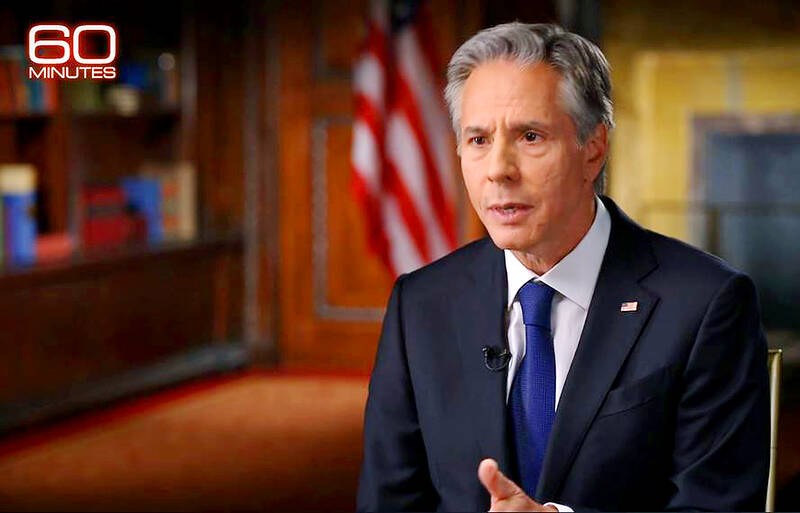If Taiwan were attacked, the global economy would face devastation, as that is where most of the world’s semiconductors are produced, US Secretary of State Antony Blinken said on Sunday.
In an interview that aired on the 60 Minutes television program, Blinken was asked whether instability across the Taiwan Strait would be felt around the world.
Blinken said that China has been increasingly aggressive against Taiwan, posing a threat to peace and stability in the region, while economically the world would feel the effects of such aggression.

Photo: screen grab from CBS
Blinken was interviewed for the program after meeting with Chinese Minister of Foreign Affairs Wang Yi (王毅) on the sidelines of the UN General Assembly in New York on Friday.
The US has invested heavily in its semiconductor capacity, with US firms designing chips that are primarily produced in Taiwan, he said.
“Taiwan itself, were anything to happen, it is where virtually all the semiconductors are made,” Blinken said. “If that’s disrupted, the effects that that would have on the global economy could be devastating.”
In an interview that aired on the previous Sunday on the same program, US President Joe Biden said that the US would defend Taiwan “if in fact there was an unprecedented attack.”
It was the fourth time Biden implied the US would help Taiwan, although each time it has been followed by a clarification from administration officials who seemed to walk back his comments.
When Blinken was asked whether Wang requested clarification of Biden’s remarks when they met, he said they had a conversion about the two approaches toward Taiwan.
“I reiterated what the president has said, and what he’s said clearly and consistently — our continued adherence to the ‘one China’ policy, our determination that the differences be resolved peacefully,” Blinken said.
“Our insistence that peace and stability be maintained in the Taiwan Strait, and our deep concern that China was taking actions to try to change that status quo. That’s what the issue is,” he said.
The US has over the past few decades maintained a stance characterized as “strategic ambiguity” regarding whether it would aid Taiwan’s defense in the event of an attack by China.
Washington has traditionally been deliberately vague about whether the US would do more than provide Taiwan with weapons, as per the Taiwan Relations Act, and send troops to fight China.
The act became law in 1979 to maintain commercial, cultural and other unofficial relations between the US and Taiwan after Washington switched diplomatic recognition from Taipei to Beijing.
The act requires the US to “provide Taiwan with arms of a defensive character.”

ENDEAVOR MANTA: The ship is programmed to automatically return to its designated home port and would self-destruct if seized by another party The Endeavor Manta, Taiwan’s first military-specification uncrewed surface vehicle (USV) tailor-made to operate in the Taiwan Strait in a bid to bolster the nation’s asymmetric combat capabilities made its first appearance at Kaohsiung’s Singda Harbor yesterday. Taking inspiration from Ukraine’s navy, which is using USVs to force Russia’s Black Sea fleet to take shelter within its own ports, CSBC Taiwan (台灣國際造船) established a research and development unit on USVs last year, CSBC chairman Huang Cheng-hung (黃正弘) said. With the exception of the satellite guidance system and the outboard motors — which were purchased from foreign companies that were not affiliated with Chinese-funded

PERMIT REVOKED: The influencer at a news conference said the National Immigration Agency was infringing on human rights and persecuting Chinese spouses Chinese influencer “Yaya in Taiwan” (亞亞在台灣) yesterday evening voluntarily left Taiwan, despite saying yesterday morning that she had “no intention” of leaving after her residence permit was revoked over her comments on Taiwan being “unified” with China by military force. The Ministry of the Interior yesterday had said that it could forcibly deport the influencer at midnight, but was considering taking a more flexible approach and beginning procedures this morning. The influencer, whose given name is Liu Zhenya (劉振亞), departed on a 8:45pm flight from Taipei International Airport (Songshan airport) to Fuzhou, China. Liu held a news conference at the airport at 7pm,

Taiwan was ranked the fourth-safest country in the world with a score of 82.9, trailing only Andorra, the United Arab Emirates and Qatar in Numbeo’s Safety Index by Country report. Taiwan’s score improved by 0.1 points compared with last year’s mid-year report, which had Taiwan fourth with a score of 82.8. However, both scores were lower than in last year’s first review, when Taiwan scored 83.3, and are a long way from when Taiwan was named the second-safest country in the world in 2021, scoring 84.8. Taiwan ranked higher than Singapore in ninth with a score of 77.4 and Japan in 10th with

GRIDLOCK: The National Fire Agency’s Special Search and Rescue team is on standby to travel to the countries to help out with the rescue effort A powerful earthquake rocked Myanmar and neighboring Thailand yesterday, killing at least three people in Bangkok and burying dozens when a high-rise building under construction collapsed. Footage shared on social media from Myanmar’s second-largest city showed widespread destruction, raising fears that many were trapped under the rubble or killed. The magnitude 7.7 earthquake, with an epicenter near Mandalay in Myanmar, struck at midday and was followed by a strong magnitude 6.4 aftershock. The extent of death, injury and destruction — especially in Myanmar, which is embroiled in a civil war and where information is tightly controlled at the best of times —